
Welcome to Plymouth College Aquatics
Key Contacts
Meet the Team
Programme Structure
PCA and Plymouth College Principles
World Aquatics Points
Performance Pathway (PE)
Potential Pathway (PO)
Pathway Squads (PA)
Para Swimmer Pathway





Welcome to Plymouth College Aquatics
Key Contacts
Meet the Team
Programme Structure
PCA and Plymouth College Principles
World Aquatics Points
Performance Pathway (PE)
Potential Pathway (PO)
Pathway Squads (PA)
Para Swimmer Pathway



Dear Parents & Athletes,
Welcome to Plymouth College Aquatics. We are a brand new entity working under the structure of an experienced high-performance swimming programme. Formed in 2024 after over 20 years of a previous partnership which saw us produce world-class results in Plymouth, we have access to the very best training facilities and resources that enable us to deliver at such a high level. Using both Plymouth College and Plymouth Life Centre, we hope that you will enjoy this new season with us.
Our mission is to develop the most well-rounded athletes we possibly can. This includes an array of qualities in addition to performance in the pool. For example, we would like to work with athletes willing and capable of entering a variety of events and distances. We aim to develop versatile, hardworking and dedicated swimmers that, when they decide to move on from Plymouth College, will take with them all the necessary prerequisites for success beyond their school years. Their maturity, politeness and receptiveness to feedback are of great importance to our programme.
We aim to accommodate rising numbers of swimmers in our new system, and commit to providing the appropriate number of coaching hours both in the pool and in the gym for the age and standard of our swimmers, in line with or bettering Swim England guidelines. In addition, we commit to ensure lane space is a priority for our athletes and endeavour to keep numbers per lane as low as practical.
As a performance programme, we acknowledge our responsibility to those athletes with international aspirations, particularly as we continue the journey leading into the 2028 Los Angeles Olympic Games as well as the other international senior and junior meets held each year.
We also acknowledge that PCA have numerous young athletes who require full support in their training and they are our future high performers . They must be given appropriate opportunities to access the best facilities, coaching and challenges to progress.
We thank you for your support and trust.
Many thanks,
Roberto Pavoni (Director of Swimming)
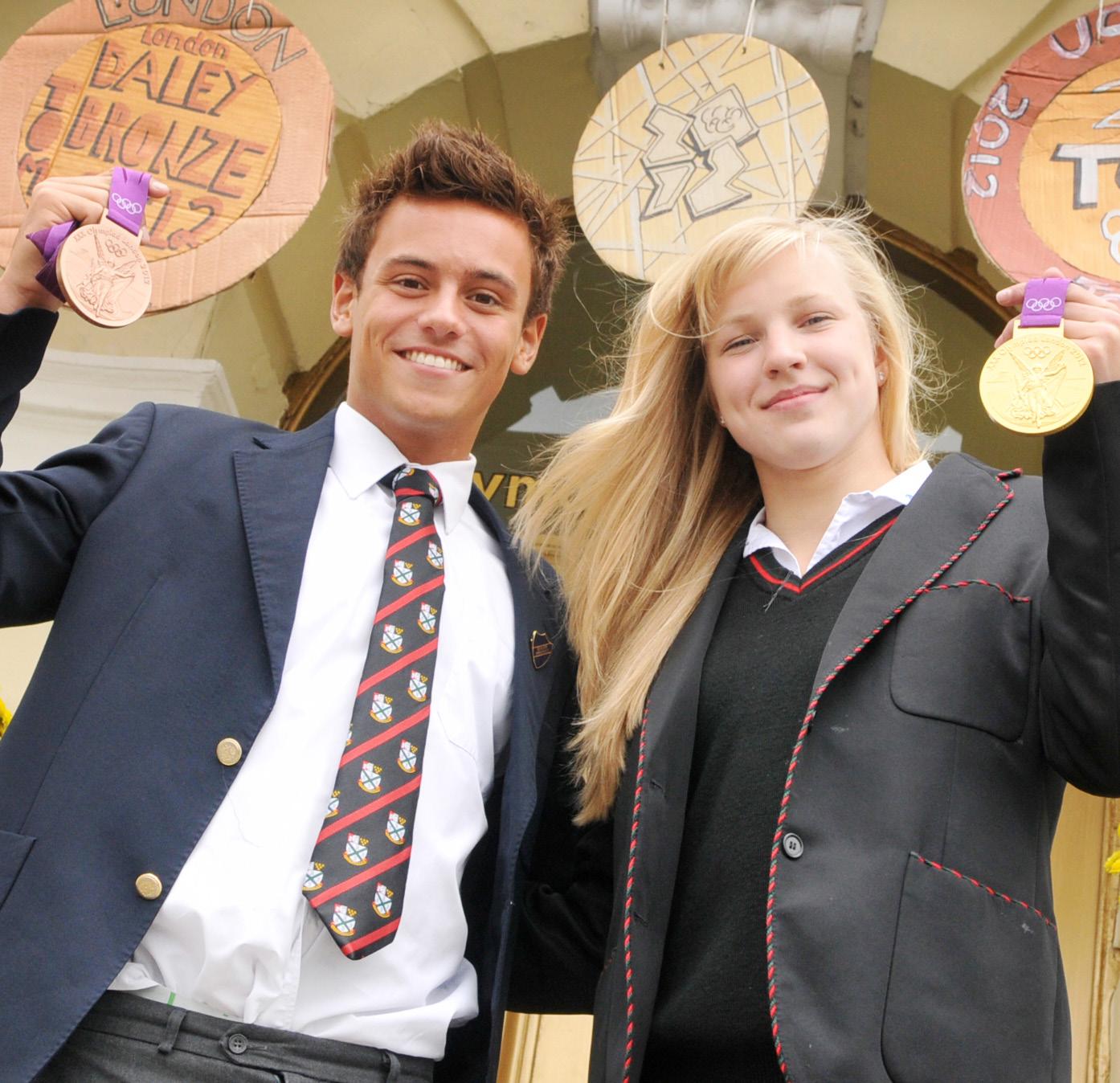
In 2021, had Plymouth College been a nation, it would have been 39th on the Olympic Medal Table. There are not many schools who can boast having produced an Olympic Champion and World Record holder, and an Olympic medallist, whilst they were still at school! Fifteen current and former pupils competed at the Paris Olympics 2024.
Plymouth College’s impressive accolades and achievements by pupils, while still at school, include Olympic, World, European and Commonwealth champions at both junior and senior levels, as well as professional rugby and football players including England Rugby player Henry Slade. We have had over 160 athletes represent 47 different nations in 15 different sports since the turn of the century, showcasing our track record of success and our internationally recognised performance sport culture.
COACHING TEAM:
ROBERTO PAVONI DIRECTOR OF SWIMMING rpavoni@plymouthcollege.com
RICHARD BEARD DEPUTY DIRECTOR OF SWIMMING rbeard@plymouthcollege.com
NATHAN GREENWOOD LEAD SWIM COACH ngreenwood@plymouthcollege.com
TILAK RAMACHANDRA MURTHY HEAD OF STRENGTH & CONDITIONING tramachandra@plymouthcollege.com COMMITTEE MEMBERS:
JO LUCAS SWIM ADMINISTRATOR swimadmin@plymouthcollege.com
PHIL MUTLOW CHAIR pmutlow@plymouthcollege.com
BETH FIELD WELFARE swimwelfare@plymouthcollege.com
MAGS TRUMAN SECRETARY mtruman@plymouthcollege.com
TIM WILLIAMS TREASURER twilliams@plymouthcollege.com
GEORGINA GRAY INDEPENDENT WELFARE OFFICER swimwelfare@plymouthcollege.com
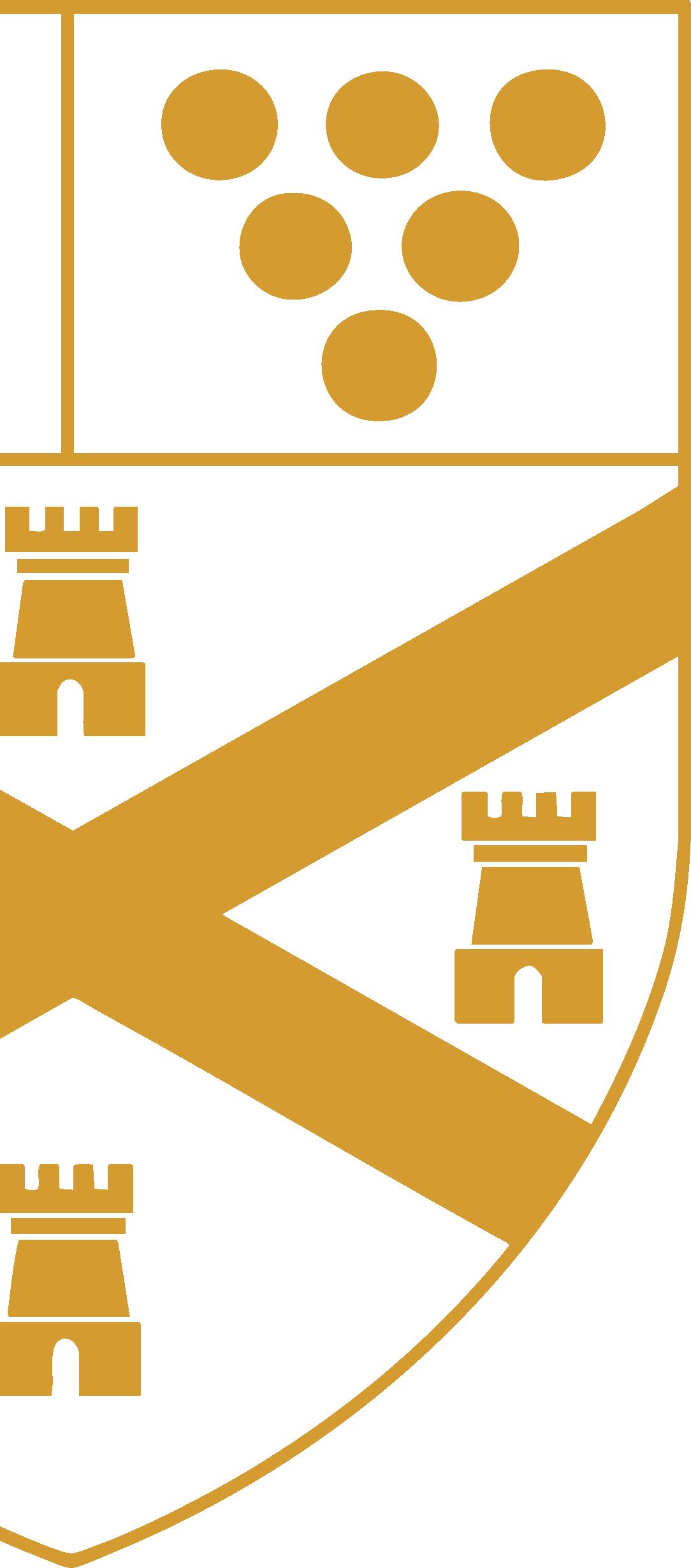
The Coaching Team at Plymouth College Aquatics believe that the most successful senior swimmers are the ones who have had access to a diverse background of training methodologies and event selections. Up to when they finish their schooling with us, our aim is to develop and nurture versatile and adaptable swimmers, who are proficient in all the four strokes, across multiple distances, displaying excellent technique. We aim to be accomplished at the important race skills such as starts, turns, finishes and relay takeovers. We encourage the swimmers to challenge themselves and push out of their comfort zones on a regular basis, both physically and mentally, as we believe this to be really healthy for their development through their swimming career.
Our experience has found that those who are able to access this type of Individual Medley structured training in their formative years (8-18) in the pool, are often the ones who are able to excel in more specific and specialized events once they leave school and transition into senior swimmers. Whether staying with our programme or not, we wish the swimmers to have all the building blocks necessary for elite performance in the future.
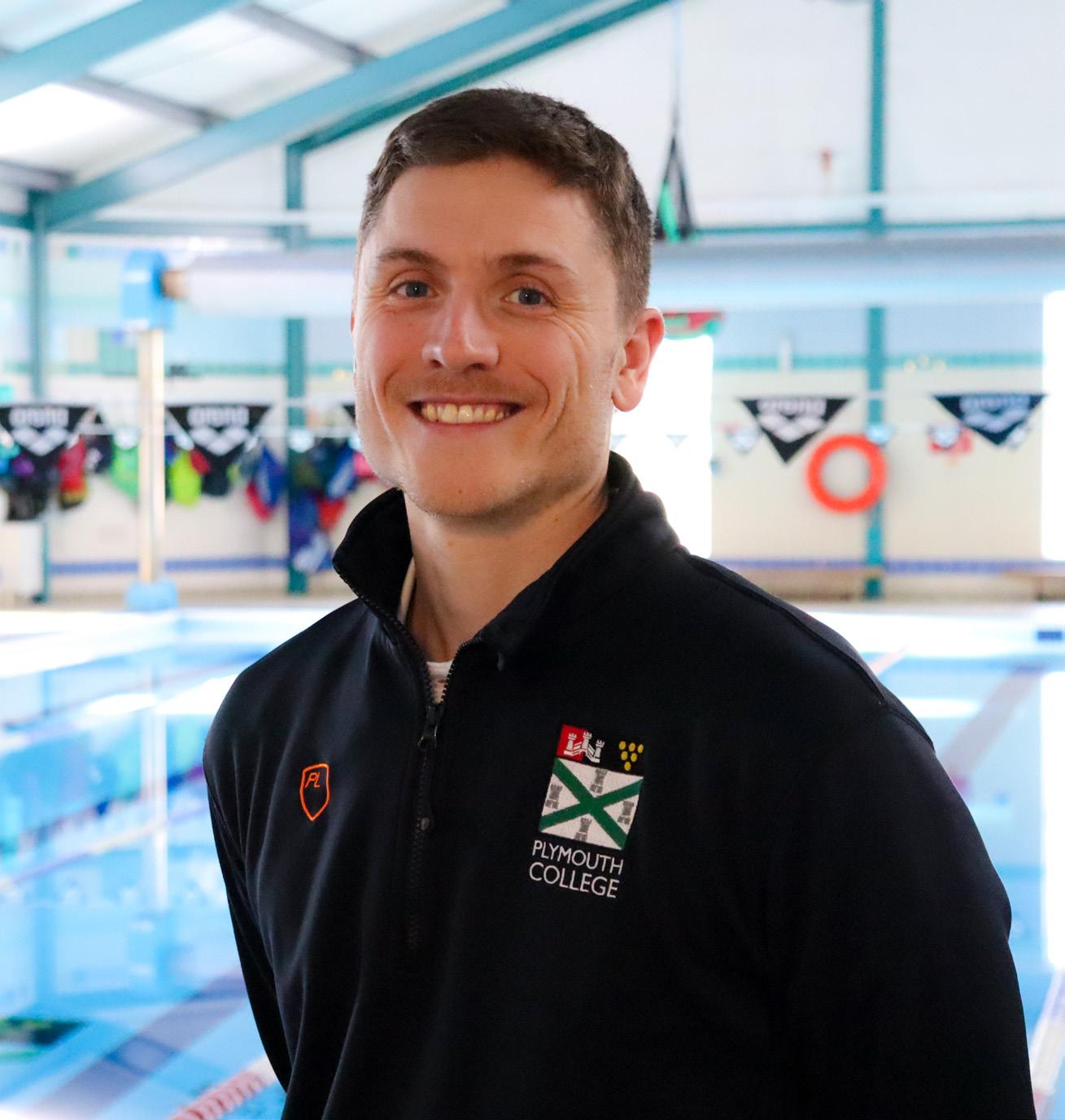
ROBERTO
PAVONI Director of Swimming
Roberto has been with the School since 2017, and was the Deputy Director for his first six years with us. Having taken the next step on his coaching journey in July 2023, Roberto is excited to lead the Club’s new direction and our 4-year plan, leading into the Los Angeles 2028 Olympic Games. Roberto was formerly an Olympian himself, competing at the London 2012 Olympics in the 400m Individual Medley and the 200m Butterfly.
As a 10 time British Champion, Roberto also won 3 European medals in 2014-2015 to add to his achievements during his international career. Since becoming a coach, Roberto has represented GBR at the 2019 European Youth Olympic Festival and 2024 European Junior Championships, and has helped many of our swimmers onto their own junior international teams. Recently, Roberto was a finalist in the 2022 Swim England South West Coach of the Year awards, and has completed the Swim England Coach 2028 Programme.

Deputy Director of Swimming
Richard returned to Plymouth College in 2023 as the new Deputy Director of Swimming. Previously, he challenged himself as the Head Coach at City of Oxford after spells as Assistant Head Coach and Head of Age Group at prominent clubs in London and the South West. He’ll bring with him his passion for the sport to inspire our swimmers to achieve more.
Richard prides himself on being a student of the sport, and loves learning to stay one step ahead of the athletes, to best guide and motivate them. He has a keen interest in sports science and human potential and more specifically in technical development and physiology.
Away from poolside, Richard is a big music fan, enjoys cycling and walking his dog on the beaches of Devon and Cornwall.

Nathan joined the team in 2024 as Lead Swim Coach.. Previously Nathan spent 6 years as a swimmer. In this time he regularly achieved a national standard of swimming and even achieved a couple of national medals during his 2013/2014 and his 2014/2015 season. Following a year away from swimming, Nathan came back to the sport for a brief stint as a competitor; it was during this time he started teaching swimming which planted the seed for the transition into coaching.
Upon achieving his coaching qualifications Nathan set out to gain experience in the coaching world with some voluntary work until he eventually felt confident enough to step up and join the Plymouth College team. He thoroughly enjoys learning more and more about the sport and how to adapt to challenges that come his way.

JO LUCAS Swim Administrator
Jo manages our Plymouth College swimmers’ needs, covering travel, catering, competition logistics, student support, and boarding liaison. She also assists the Director and Deputy Director of Swimming.

Tilak has been with Plymouth College since March 2024, serving as the Graduate Strength and Conditioning Coach. Having taken the next step as Head of S&C on his coaching journey in September 2024, Tilak is excited to drive the Club’s new performance initiatives and contribute to our strategic plan during the next Olympic cycle.
Tilak holds an MSc in Strength, Conditioning, and Rehabilitation and is an Accredited Strength and Conditioning Coach (ASCC) from the UKSCA, as well as a Certified Strength and Conditioning Specialist (CSCS) from the NSCA. His academic and professional background equips him with cutting-edge techniques and knowledge to enhance swimmer performance through meticulously designed dryland strength training programs.
Before joining us, Tilak made significant contributions across multiple sports disciplines, including football, athletics, cricket, and badminton. Notably, Tilak has also coached several national record-holder swimmers across various age groups and seniors in India, showcasing his ability to elevate athletes to elite levels.
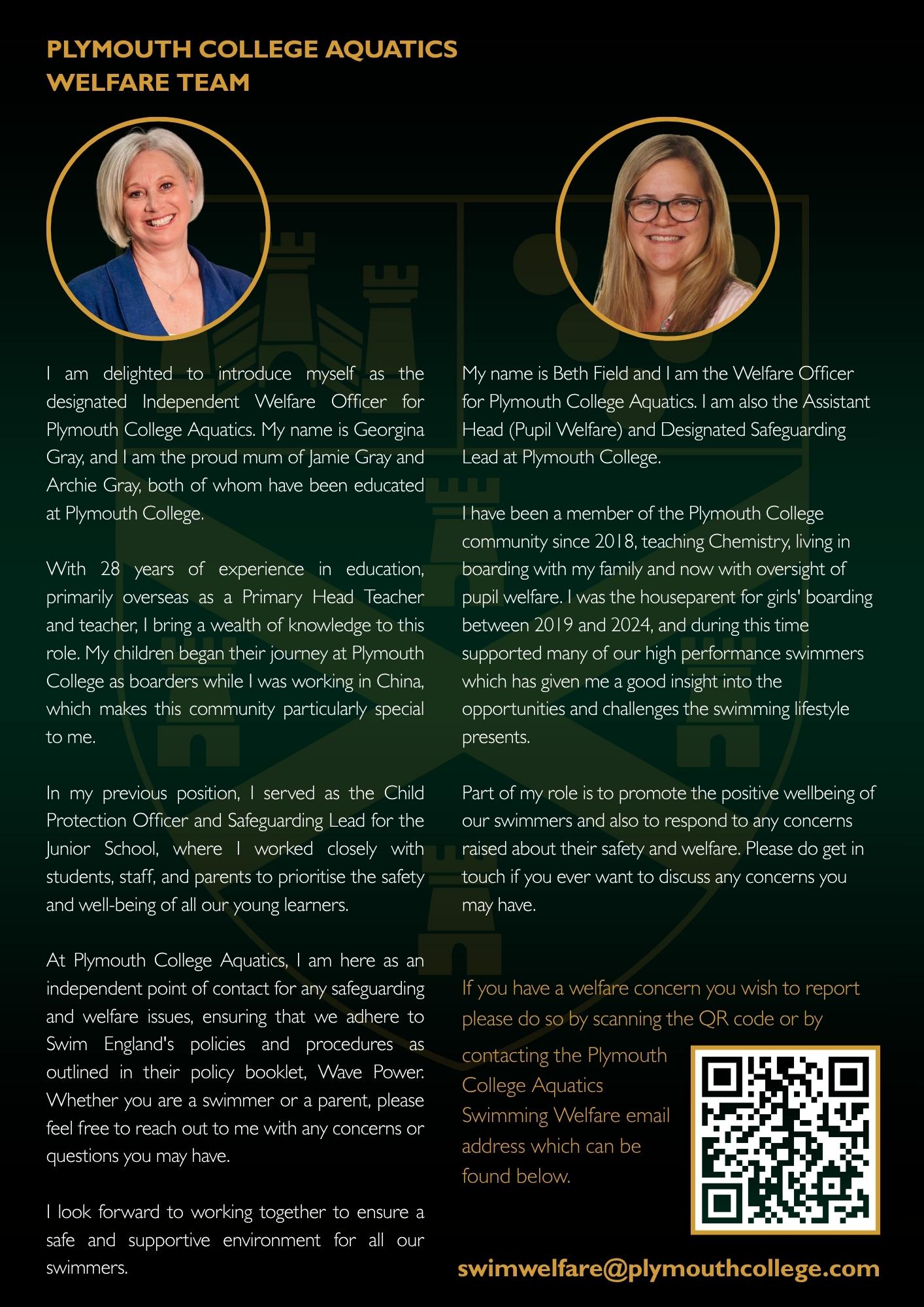

Plymouth College Aquatics is one of Britain’s premier swim programmes. The programme allows swimmers from all over the UK, and indeed the world, to meet the demands of high performance swimming coupled with first-class support to achieve academic success.
The College can provide boarding accommodation and nutrition suitable for highperforming athletes. Support staff can access and draw on the experience of experts in the fields of strength and conditioning, physiotherapy, sports psychology, education, transport, coaching and facilities.
The College has its own on-site 25m pool and strength & conditioning suite, and also makes use of Plymouth Life Centre’s incredible 10x50m long course facility on several occasions each week. This 50m pool is a mere 5 minute drive away and transport is arranged for all boarders, and for day pupils if during school hours.
Plymouth College provides flexible learning programmes which allow athletes to study at a place that suits their training needs. We are one of the few British swimming programmes recognised for our work by the National Association for Gifted Children. The combined programme offers many unique benefits, which allows young athletes to flourish, both in the pool and in the classroom—without one compromising the other. Bursaries and swimming scholarships may be available upon request.
The College employs three full-time swim coaches, and a full time Head of S&C supported by two graduate assistants. The College also employs a part-time swimming administrator to help with the logistical arrangements of competitions and training.
Athletes who join Plymouth College will become more than just better pupils and faster swimmers. They will learn and develop values that with benefit them for the rest of their lives, and will strongly contribute to becoming well-rounded young people. Team spirit, respect, discipline, compassion, organisation, decision making under pressure, attention to detail, humility, service and commitment are but a few principles that we believe in and teach on a daily basis.
Plymouth College Aquatics allows individuals to come to Plymouth from a young age and to remain part of the programme up to - and possibly beyond - the conclusion of
their schooling, allowing them to have consistency in coaching into their university years or post-18 careers. The programme has hosted many day and boarding pupils who have developed into Olympic and World champions, World, European and Commonwealth record holders and medalists, and Paralympic qualifiers. It ensures regular international selections for Great Britain and home nations’ swim teams, as well as facilitating international success for athletes from many overseas nationals. Recent alumni of the College include Ruta Meilutyte, Benjamin Proud, Laura Stephens, Thomas Fannon, Jessica Jackson, Aimee Canny, Honey Osrin, Joshua Gammon, Sophie Freeman and many more.
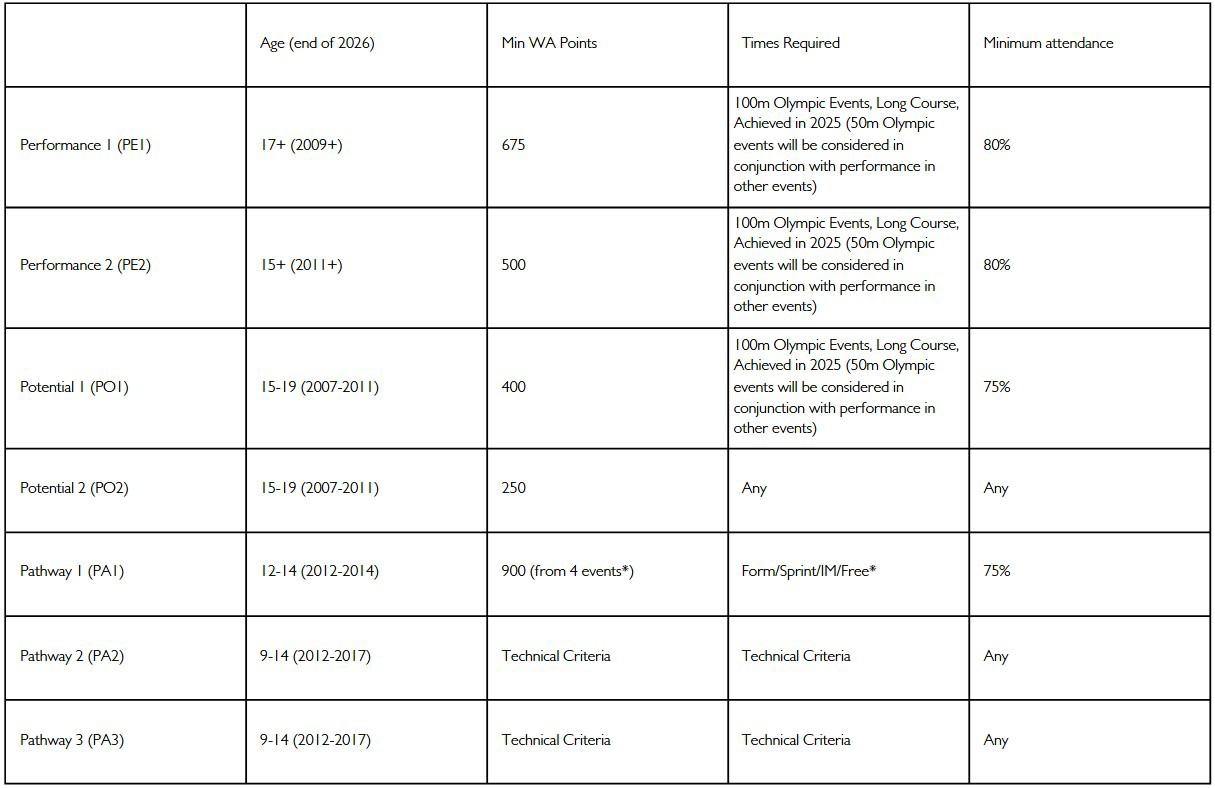
PERFORMANCE (PE1, PE2)
15 YEARS +
Coaches: Roberto Pavoni and Richard Beard
POTENTIAL (PO1, PO2)
15-19 YEARS
Coach: Nathan Greenwood
PATHWAY (PA1, PA2, PA3) 8-14 YEARS
Coach: Nathan Greenwood
Working together with squad coaches and team mates to create individual and collective goals that are inspiring. Using SMART goal strategies, we provide the platform for athletes to take each stepping stone towards extraordinary achievements. Over time, with experience and age, swimmers are encouraged to become more internally motivated and take responsibility and autonomy for their goals.
Upholding the values of our school, and more specifically of our swimming club within an Aquatics GB and World Aquatics setting. We educate athletes on the rules and values of our sport, fostering their understanding and offering opportunities to hold themselves accountable. Fair play, sportsmanship and anti-doping policies are a key factor of this principle. Acknowledging that it’s okay to make mistakes but being honest and true to yourself and the team are important to us.
Being one of the most diverse school swimming programmes in the country. Each year we have around twenty swimmers starting in our school from all over the world, all with different cultures and backgrounds. These differences are celebrated, and they add to our team; everyone is welcome. In swimming there are many highs and lows, all of which form part of the journey. Our team is there for each other at all the various stages in this journey.
Using setbacks to provide fuel for future motivation. We acknowledge that successful people in all industries, sporting or other, often cite their struggles and key setbacks as being a defining moment in their life. Staying resilient through injuries, illnesses, plateaus and other difficult moments in our careers helps us to be stronger next time. The journey is what makes the end achievement even more rewarding. The team will find ample challenges and opportunities to test their resilience both in training and in racing.
COLLEGE PRINCIPLES
Understanding that we are lucky to have an exceptional school and sporting environment with facilities, expertise and opportunities that most athletes of our age can only dream of. With this understanding comes the need to protect and preserve our equipment and environment, whether personal or school issued, so that it can be utilised and enjoyed by others. Being understanding and accepting that all team members have a voice within the group and treating each with equal respect. We also instil a recognition of authority and ask athletes to be courteous to staff members who are here to help.
PRINCIPLE
Recognising that an important part of our team is giving back to others. Starting with the coaches and staff who serve the individual needs of each athlete, we offer opportunities for athletes to assist coaching sessions, or more informally within some sessions we take part in peer to peer coaching. We also have two swim captains that are elected each year to lead and give back to their colleagues. Recognising the needs of others before our own, particularly those who need our help.
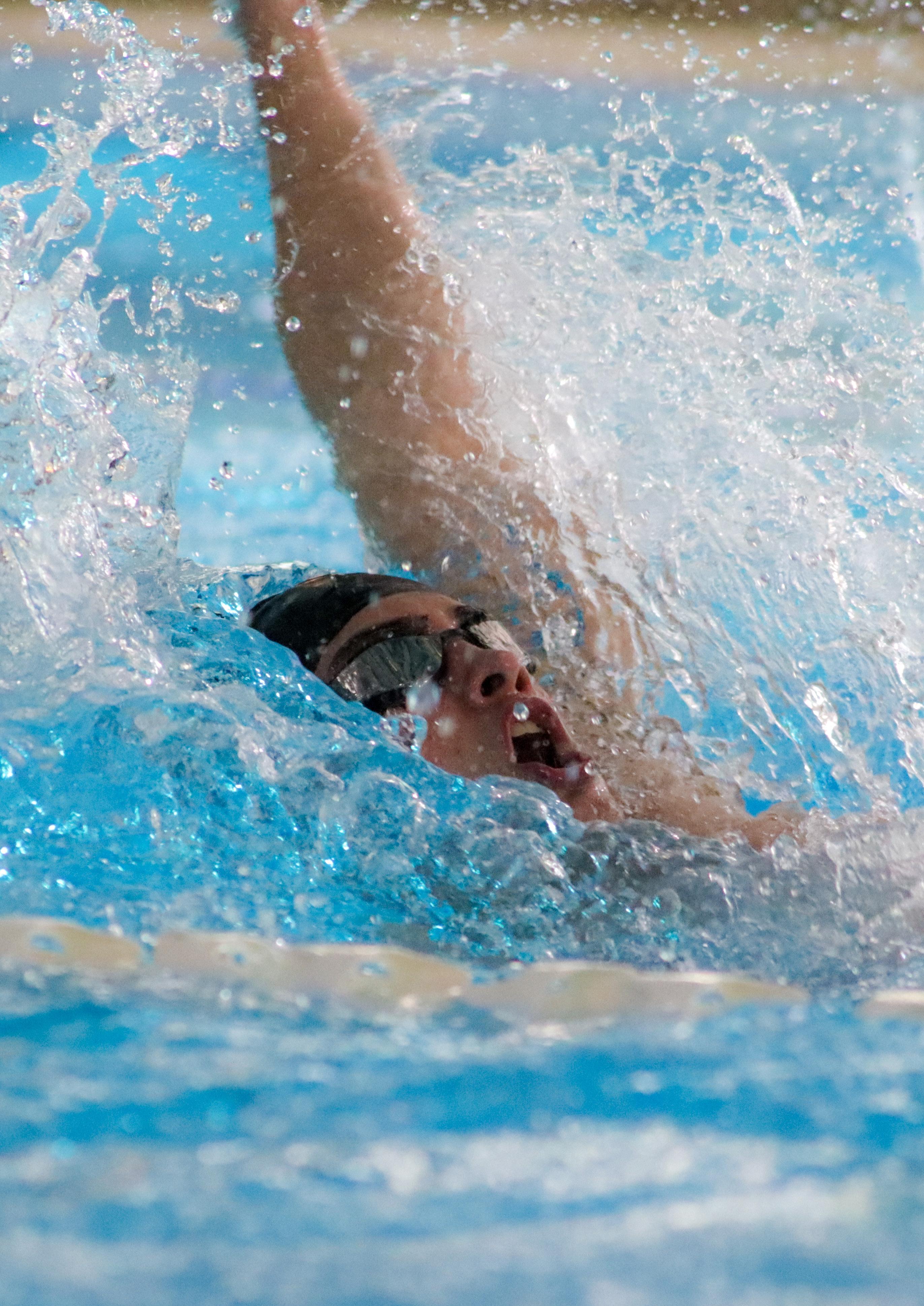
The aim of the World Aquatics Points Table is to allow comparisons of results across different events. It is often difficult to compare 50m Freestyle performances with 400m Individual Medley performances, for example, but the table makes this clearer.
The World Aquatics Point Scoring assigns point values (WA Points) to swimming performances. The world record time is set to 1000 points, and the closer the time to this standard, the more points a swimmer will achieve. The points score becomes progressively less as the times increase (become slower).
Point values are assigned and updated every year to account for any new world records. There is one set of points for short course and another for long course. For short course (SCM) the base times are defined with the cut off date of August 31st. For long course (LCM) the base times are defined at December 31st.
The base times are published on the World Aquatics website within one month after the end of the relevant period. For a more in depth and technical explanation of how the points are calculated, and to view the aforementioned table, please visit the World Aquatics website: https://www.worldaquatics.com/swimming/points
WA points at a younger age (around 15years and younger) tend to be slightly lower for boys than girls, due to them being, in general, less developed. Since they are usually further from physical maturation than girls, they tend to be further away from the world record times in comparison, and as such, achieve slightly lower scores. As a result, there will be considerations for boys at this age when moving from the Age Group to Youth Pathways.
Swimmers in the Performance Pathway will be extremely committed and dedicated athletes, already performing at a high level, looking to improve towards the next stage in their career. The beginning of this pathway will start at 15 years of age (as of 31/12/2026), and a minimum of 500 World Aquatics Points, working all the way up to senior athletes of an Olympic or Paralympic level. Younger athletes may be included in highly exceptional circumstances, at the sole discretion of the Director of Swimming. The demands of this pathway are high, but the rewards are great for those who are willing to work for long term success.
The pathway has access to over 18hrs of pool time per week, including 8hrs of long course (50m) training, as well as 3hrs of specific strength & conditioning (S&C) training with a dedicated S&C coach. Swimmers in this pathway will share mutual values and attitudes, including hard work, consistency, resilience, enthusiasm, passion, coachability and other high-performance traits.
PE1: Roberto Pavoni
PE2: Richard Beard
EQUIPMENT (FOR EVERY SESSION)
Kit bag, kick board, pull buoy, fins (short), hand paddles, finger paddles, snorkel, resistance aid (a limited number of sponges, parachutes, propellers will be available to borrow), 2x one litre drinks bottles, swimming costume and spare, goggles and spares, foam roller (recommended), PCA hat, Tempo Trainer (optional).



Swimmers in the Potential Pathway will be committed and dedicated athletes, showing great promise for the future. Already performing at a strong level, these swimmers will be working towards a place in the Performance Pathway in the near future. The pathway is specifically designed for swimmers who are developing at a slightly later stage than some of their peers, but have goals of one day achieving the same lofty heights.
The beginning of this pathway will start at 15 years of age (as of 31/12/2026) and a minimum standard of working towards and entering competitions as directed by the Plymouth College Aquatics Competition Calendar, and will finish at the completion of school academics, working all the way up to senior athletes achieving up to 499 World Aquatics Points. The demands of this pathway are reasonable, but the rewards are great for those who are willing to work for long term success.
The pathway has access to between 12.25-16.75hrs of pool time per week, depending on the age and level of the athlete, which includes up to 3 long course sessions, as well as 2-3hrs of specific strength & conditioning (S&C) training with a dedicated S&C coach. Swimmers in this pathway will share mutual values and attitudes, including hard work, consistency, resilience, enthusiasm, passion, coachability, and will have a love for swimming that they are keen to explore.
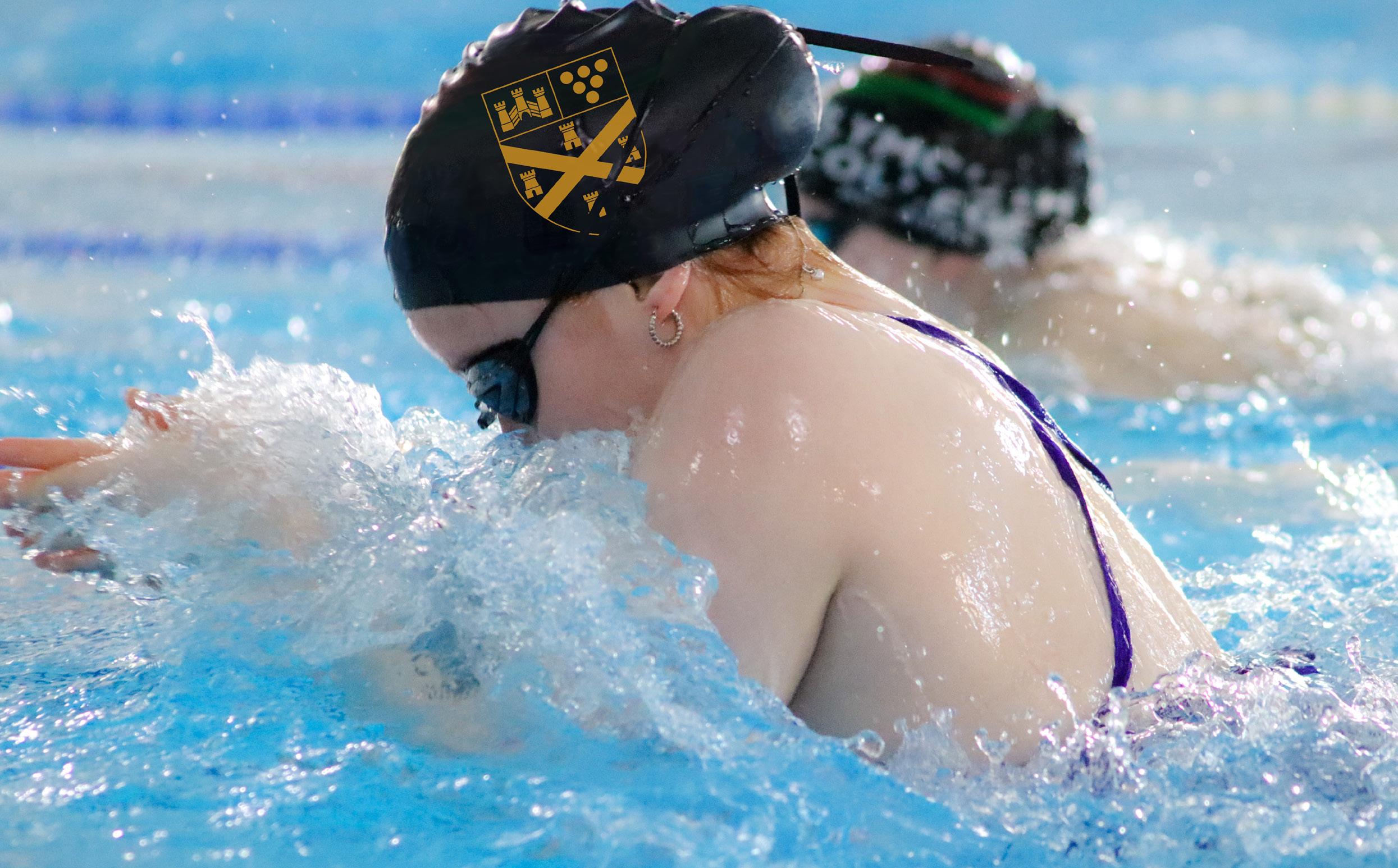

COACH
PO1, PO2: Nathan Greenwood
EQUIPMENT (FOR EVERY SESSION)
Kit bag, kick board, pull buoy, fins (short), hand paddles, finger paddles, snorkel, resistance aid (a limited number of sponges, parachutes, propellers will be available to borrow), 2x one litre drinks bottles, swimming costume and spare, goggles and spares, foam roller (recommended), PCA hat, Tempo Trainer (optional).
Swimmers in the Pathway squads will be athletes at the very beginning of their journey, who are aiming to improve consistently each season. Swimmers will be training for a wide range of events, predominantly focused around the Individual Medley, which has been shown to be key for the long term development of athletes of this age. Athletes will be focusing heavily on their technique in these years, and as such, the main goal for swimmers and coaches in this pathway will be to learn and practise sound skills of all four strokes, underwater kicking, and racing skills such as starts, turns and finishes.
The beginning of this pathway will start at 8 years of age (as of 31/12/2026), and will finish at 14 years of age (as of 31/12/2026). The initial standard will be of swimmers who have recently graduated from Learn-to-Swim lessons. As the swimmers progress in age and ability, their level will most likely become of county, regional and possibly national standard for high-achievers, although the primary factor for progression will be their ability to perform the required skills in training, and at a later stage, in racing. The demands of this pathway are very low initially, but as the swimmers progress towards a higher level and/or approach 14 years of age, the demands will become more a little more challenging.
The pathway has access to between 7.5-14.75hrs of pool time per week, depending on the age and level of the athlete. This includes up to 1 long course session, as well as up to 2hrs of specific strength & conditioning (S&C) training with a dedicated S&C coach. Swimmers in this pathway will share mutual values and attitudes, including consistency, enthusiasm, passion, coachability, kindness and will have a love for swimming that they are keen to explore.
EXPECTATIONS OF THIS PATHWAY:

COACH
PA1, PA2, PA3: Nathan Greenwood

EQUIPMENT (FOR EVERY SESSION)
Kit bag, kick board, pull buoy, fins (short), hand paddles, finger paddles, snorkel, 2x one litre drinks bottles, swimming costume and spare, goggles and spares, foam roller (recommended), PCA hat, Tempo Trainer (optional).
Sprint: Taken from the highest WA points scored out of the following events: 50m/100m Butterfly, 50m/100m Backstroke, 50m/100m Breaststroke, 50m/100m Freestyle, 100m Individual Medley
Medley: Taken from the highest WA points scored out of the following events: 200m/400m Individual Medley
Freestyle: Taken from the highest WA points scored out of the following events: 200m/400m/800m/1500m Freestyle
Form: Taken from the highest WA points scored out of the following events: 200m Butterfly, 200m Backstroke, 200m Breaststroke
Total World Aquatics Points used for squad placements: Will be the sum of the 4 highest scoring events as above. A minimum of 900 points is needed to progress to PA1.
Swimmers in the Para Swimmer Pathway will have a wide variety of individual circumstances and as such, it is difficult to pre-define the necessary requirements, expectations and situations for each person. However, each individual case will be considered carefully, in conjunction with the Director of Swimming, PCA Committee members, and other relevant coaches/persons in order to find the best possible squad placement and environment for the swimmer in question.
Clearly, the aims and goals of the athlete must be taken into account, and reviewed at regular intervals with all the above parties, but it would be anticipated that swimmers in this pathway would be dedicated and promising athletes, who are improving consistently each season. The beginning of this pathway will start at 11 years of age (as of 31/12/2026) and the initial standard will be in line with swimmers in our Pathway squads, as outlined in the previous pages. As the swimmers progress in age and ability, if they have become classified by British Para Swimming, they may gain recognition and selection onto Swim England or British Para Swimming Pathways (or international equivalents). At this time, the swimmer would likely need to progress through our squads, and discussions would be held in regards to the most suitable training partners for this athlete, taking into account both the individual’s and the group’s best interests. Swimmers in this pathway will share mutual values and attitudes, including consistency, enthusiasm, passion, coachability, kindness, hard work, and will have a love for swimming that they are keen to explore.
- To behave in a manner that is befitting of a high-performing athlete who upholds the values of Plymouth College, in line with the Athlete Code of Conduct
- The Director of Swimming will have the final decision on any squad moves
The Para Swimmer Pathway coaches will be dependent upon the squad placement for each individual swimmer. Please see the other pathways for more details.

Plymouth College Strength & Conditioning (S&C) stands out for its unique commitment to providing a high-performance training environment within an academic setting. Unlike many traditional school-based programmes, our approach is professional, evidence-led, and individually tailored to meet the needs of each athlete.
At the heart of the programme is a long-term athletic development model, designed to enhance not only physical performance, but also to foster discipline, resilience, and a lifelong understanding of health and fitness.
Our programme is about educating the whole athlete. Beyond physical training, we focus on helping students understand the ‘why’ behind their training. We aim to develop independence, accountability, and confidence. This holistic, athlete-centred philosophy ensures they grow not just as athletes, but as well-rounded individuals ready to succeed in all areas of life.
Our programme integrates cutting-edge sports science into everyday training, offering pupils:
- Expert coaching and structured periodisation – Trained under highly qualified and experienced S&C coaches, with individual periodisation aligned to national and international competition calendars
- Bespoke, data-informed training plans
- Facilities and systems that mirror elite sports academies
- Comprehensive support, including performance testing, injury prevention, recovery protocols, and more
- Flexible delivery, including provision at major competitions and sessions during free periods to suit the demands of academic and athletic schedules
‘‘I believe in data and research. We begin with a comprehensive testing battery and perform a detailed gap analysis for each athlete. After considering the coach’s perspective and the athlete’s goals, every squad and athlete receives a tailored training plan focused on closing those gaps.
Alongside this, we implement an integrated prehabilitation programme to minimise injury risk and support longterm, sustainable development. These plans are then shared with the relevant skills coaches to ensure a fully aligned performance approach.’’
We cater to athletes at all levels - whether at school or competing internationallyensuring that their academic and personal development is prioritised.
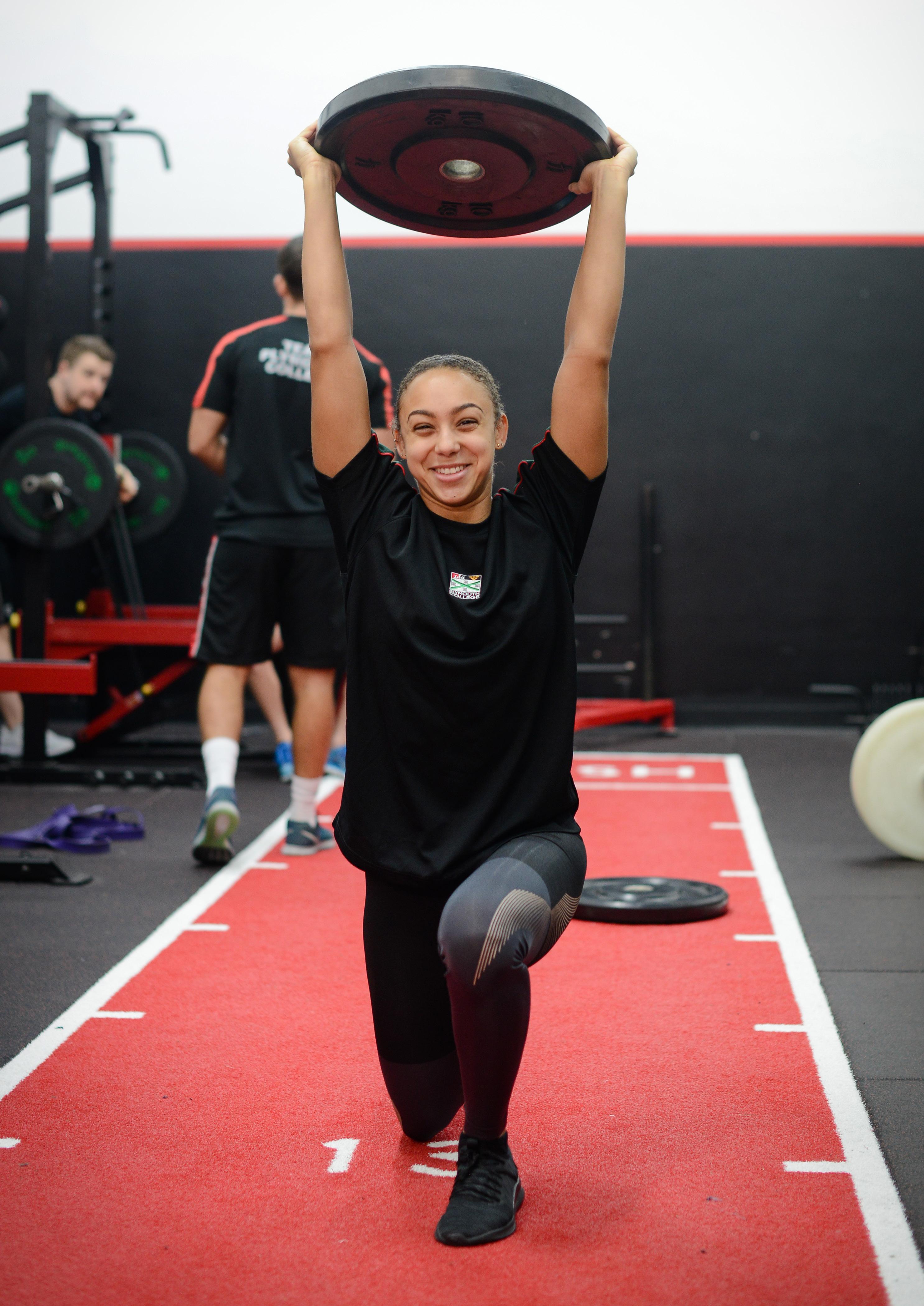
To cover annual Swim England, Regional, County and Club membership from the 1st of January to the 31st of December (national annual date is given until February). All swimmers under 18 years need to have a parent registered as Club Support
- Swimmer £55
- Associate/Parent (Club Support) £15
- Family (parent and 2 swimmers) £120
- Each additional swimmer £40
See table opposite
1. Available by request and negotiation
2. Coaches and senior athletes (18 years or over) in the PCA Programme can offer One-To-One sessions at the Plymouth College pool with PCA athletes at times advertised during school holiday periods on the request of this service from PCA families/athletes.
3. Such coaches/senior athletes will ALL be:
- 18 years of age or over (unless supervised throughout the session by a PCA coach with a minimum of a UKCC Level 2 coaching qualification)
- Members of PCA and registered with Swim England
- Current members of the IoS and/or the BSCA
- Successfully completed an enhanced DBS check through PCA
- Coaches who are coaching a minimum number of two sessions per week in the PCA Coaching Programme or senior athletes given clearance by the Director of Swimming to perform this service
4. The financial agreement/arrangement between the family/athlete and the coach is a private affair.

1. Athletes who do not attend an a.m. session (where an attendance was expected) are not to attend a p.m. session in the same day. This policy does not apply during Post Meet Protocol.
2. Allocated Strength & Conditioning sessions are compulsory sessions for all athletes.
3. Athletes carrying an injury or returning from injury who are unable to complete the full requirements of a pool session may be allocated alternative sessions during this period.
4. Athletes shall enter and, if accepted, attend the End of Cycle Meets promoted by the Director of Swimming. Athletes shall endeavour to enter and, if accepted, attend the mid-cycle meets promoted by the Director of Swimming.
5. It is strongly advised that athletes complete and maintain a log book of all of their poolbased training sessions. It is understood that fully committed athletes will see this as an essential part of their development.
· Log books should include swim set content, total session volume and all recorded set results.
· Log books should also include competition results, splits, stroke counts and other feedback from coaching staff.
· Log books can be collected in on a regular basis by a member of the coaching staff for review and written comment if requested by the athlete.
· Athletes may be asked to bring their log book to training sessions for review when requested by the Director of Swimming or the relevant Squad Coach.
6. Athletes/Parents should strongly consider planning any family holidays or any residential school trips, excursions or camps outside of the swimming season. The annual shut down period is the perfect opportunity for such activities.
7. Athletes shall not enter any meets which are not listed on the PCA Competition Calendar without express permission from the Director of Swimming in conjunction with their squad coach. Unless clearance is explicitly given by the Director of Swimming and the relevant squad coach, entries for events outside of the PCA calendar are strongly discouraged as they can lead to over competition in unnecessary events which interfere with training and the long term development of the athlete. Times achieved at meets not agreed with the Director of Swimming are not likely to be considered for squad placements.
8. During 2025-2026, (unless contrary reason is provided by the Director of Swimming), athletes in this programme shall be expected to enter:
· The Swim England South West Winter Championships (where QT’s are achieved).
· The English Winter Nationals (where QTs are achieved).
· The Aquatics GB Swimming Championships (where QT’s are achieved).
· The Swim England South West Youth or Age Championships (where QT’s are achieved).
· The Aquatics GB Next Gen Championships (where qualifying is achieved).
· The Home Nations Summer National Championships (where qualifying is achieved).
· All End of Cycle Meets.
· All other mid-cycle meets and specialised events as directed by the Director of Swimming.
9. All National, Regional and County selections for competition, camps and/or training opportunities will be discussed with the Director of Swimming or Deputy Director of Swimming prior to responding to/application to the inviting body.
10. All athletes are expected, if selected, to be available to represent PCA in the following events in the 2025-2026 period:
· Devon County Swim England Relay Competitions.
· Devon County Inter Club Championships.
· Swim England South West Relay Competitions (Age or Youth).
· National Relay Competitions (British and/or English National Summer Championships)
· ESSA Championships (Regional and/or National).
· Arena League Rounds 1, 2, 3 and National Final (if applicable).
· Junior Arena League (if applicable).
11. Athletes will not compete for any other team in any League competition without the express permission or recommendation from the Director of Swimming.
12. Prior to, during and following competition, athletes will follow the dress/uniform code for that particular meet and athletes will always be in possession of a full complement of PCA uniform at such competitions. PCA Swim Caps will not depict the names of other athletes. Athletes who do not own items on the uniform list and do not intend to own such items should not apply to join the programme.
13. At all competitions, all PCA athletes are expected to abide by the rules and the Code of Conduct promoted by PCA. All athletes will attend finals sessions & support team members that are in finals unless otherwise directed by the Director of Swimming.
14. Athletes will consult with the relevant squad coach regarding their entries for all meets before submitting their online entries. Entries will not be submitted by PCA unless they have been signed off by the relevant squad coach.
15. Athletes who do not receive an invitation to compete in an individual event in the British and/or one of the Home Nations National Championships (summer) or who are not required to race in a PCA relay at one of these Championships may be required to move into an alternative coaching squad for the remainder of the season.
16. Only PCA swim hats are to be worn in the racing environment. During training, PCA swim hats must be worn during the school week (Monday-Friday), but on weekend training athletes may wear a swim hat of their choice.
17. Clothing worn in strength & conditioning sessions may not promote or advertise swim programmes/clubs with whom the athlete has no direct current or historical association.
18. Athletes may be at risk of losing their place in the programme if these criteria are not met and maintained. Athletes and/or parents will be involved in discussion with the Director of Swimming before such measures are utilised.
19. Athletes entering an important period of public examinations or similar circumstances and who feel that their training commitments cannot be met must discuss arrangements with the Director of Swimming or the relevant squad coach well in advance of the required period.
20. Where places remain in the squad (where, in the Director of Swimming’s opinion, lane space is not fully allocated and athletes could be added without their inclusion being detrimental to the coaching space available to those athletes already selected via the squad criteria), athletes may be offered the opportunity to fill the remaining places in the squad if the Director of Swimming views that their inclusion in the programme will enhance the squad dynamic and that the athlete has the potential to achieve the squad criteria during the season. Such positions would be reviewed by the Director of Swimming on 31/12/25 and 01/05/26 respectively.
21. The Director of Swimming, in conjunction with the PCA Committee, reserves the right to alter the criteria for this programme at any time. The protocols and criteria will be reviewed by the Director of Swimming in conjunction with the PCA Committee when deemed necessary.
22. Athletes and parents are expected to conform with the PCA Codes of Conduct at all times and comply with any temporary rules introduced by the PCA Committee or the Coaching Team.
The Director of Swimming’s decision on whether or not athletes are displaying sufficient commitment to the programme will be final.

i. The 2025-2026 swimming season is the coaching period 1st September 2025 to 31st August 2026.
ii. Plymouth College operates a 12-month commitment policy for coaching fees, which means an annual fee for each squad is split into equal payments to cover training costs for the season. All these payments are interest free to assist families and athletes with their financial commitment over this period. For the avoidance of doubt fees are due irrespective of any failure in any selected payment method.
iii. Coaching fees are required to be paid in 10 instalments, payable monthly during the period September 2025 to June 2026 unless it has been agreed otherwise by the PCA Committee.
iv. Athletes choosing to leave the programme before June must give at least two complete months’ notice, in writing to the Club Membership Secretary (swimadmin@ plymouthcollege.com) and payment made for this period.
v. Plymouth College reserves the right to withdraw swimming facilities and positions within squads from those members who fall into arrears with ANY payments to the Club. It is the responsibility of the athlete and/or parent of the athlete to cancel direct debits when an athlete leaves the Club. Refunds will only be considered from the date of receipt of a letter of resignation.
vi. Any member who is more than four weeks behind with a coaching fee or other administration charge/s rendered by the Club will be given a notice offering 10 days to clear the debt and to include a £25 administration charge. If after this period of time payment is still due, the member will be suspended from all PCA activity and their registration with Swim England may be cancelled in accordance with the club’s constitution. A new application to join PCA would subsequently have to be completed, including the relevant membership charges.
vii. All membership and coaching fees must be paid before any swimming/coaching can take place and any monies owing to the Club must be cleared before an athlete can resume coaching sessions with the programme at the beginning of a new season.
vii. When an athlete suffers injury or illness and is unable to train or compete fees remain payable. When an athlete can not train for a period in excess of 2 months, the PCA Committee may consider (at their discretion) an application in writing for payments to be deferred or waived from the date that the application is made.
ix. All fees are rendered in British Pounds. All payments must cater for bank charges and exchange rates. In the event of short payment due to transmission charges, only the net amount will be credited to a membership/coaching fee.
x. PCA do not include Personal or Travel Insurance in any of their membership terms. Swim England Insurance is only valid if all fees are up to date and necessary membership forms have been completed and accepted by the Club.
xi. Annual Club and Swim England Registration Fees are payable before the swimmer can enter the pool. These are then payable each February, giving both the swimmer and adult Swim England registered Member Insurance, and are listed on page 28 of this document.
xii. Athletes competing at events outside of the UK that are not organised by PCA will need to complete an International Permit before they can race abroad. This needs to be in place before they leave and it is recommended that this is done at the earliest opportunity when joining the Club. It is valid for 12 months from registration. Times achieved abroad can then be imported to British Rankings after the event.
